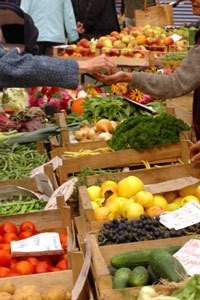
Few of us would argue the health and environmental benefits of locally produced food. It is usually the freshest, best tasting and most nutritious food we can give our bodies, and growing, harvesting, and transporting it locally leaves the smallest carbon footprint and does the least amount of damage to the environment. Unfortunately, not all natural resources are allocated equally. In other words, bananas don't grow in the snow. Here is how to make healthy food choices for you and the environment when shopping locally just isn't an option.
The term Locavore first rolled off someone's tongue publicly in 2005 when it was coined by a San Francisco woman, who on World Environment Day challenged members of her community to eat only food produced within a 150-mile radius of their home. Mainstream media quickly adopted the term, which is now commonly used to describe consumers who consciously choose to buy and eat only locally grown food. Even if you have never heard the term before, your kids probably have. In just three short years, Locavore has received so much momentum that in 2007 it was selected 'Word of the Year' by the folks at New Oxford American Dictionary (carbon neutral won in 2006).
According to Oxford University Press, the word Locavore describes a "movement that encourages consumers to buy from farmers' markets or even to grow or pick their own food, arguing that fresh, local products are more nutritious and taste better. Locavores also shun supermarket offerings as an environmentally friendly measure, since shipping food over long distances often requires more fuel for transportation."
"Shunning supermarket offerings" in favor of the farmers' market might work in Utopia, but it sounds a bit impractical (if not a bit elitist) to those of us who are geographically challenged and live with winter nearly nine months out of the year. For some of us, the idea of going all winter without a glass of fresh orange juice or bananas on our cornflakes isn't appealing (or realistic). Giving up our imported fruits and veggies leaves us with root vegetables, assorted meats and dairy products and large plastic jars of vitamins-which, incidentally, are probably not manufactured locally.
The healthiest diets come from eating a variety of fresh foods, and living in a colder climate means less available options during certain times of the year. Although hydroponics make it possible to produce some vegetables (and perhaps some fruits) year-round, even that has its limitations. Considering both human and environmental health, here is a guideline to sourcing food (listed from most optimal to least favorable) if you are unable to get it locally:
This list was adapted from http://www.locavores.com

About The Author: Ellen Brown is an environmental writer and photographer and the owner of Sustainable Media, an environmental media company that specializes in helping businesses and organizations promote eco-friendly products and services. Contact her on the web at http://www.sustainable-media.com
Add your voice! Click below to comment. ThriftyFun is powered by your wisdom!
Here is a great site that will help you find local places to buy food and other things.
I love the farmer's markets myself, our local one just started up last weekend. No real food yet but lots of plants!
I'm a localvore . . .locavore sounds like the Spanish word loco (which means crazy).
Add your voice! Click below to comment. ThriftyFun is powered by your wisdom!